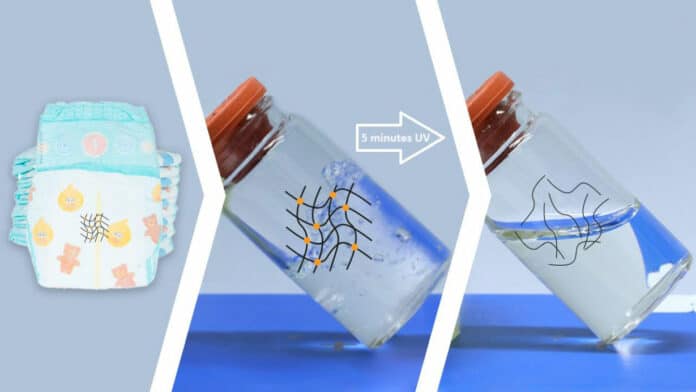Since recycling superabsorbers made of crosslinked sodium polyacrylate polymers is tricky, two million tons of them are burned or landfilled annually. Superabsorber recycling would significantly reduce environmental contamination and encourage these polymers’ sustainable usage if done quickly and effectively.
Karlsruhe Institute of Technology (KIT) scientists have significantly enhanced their intricate recycling process. The chemical chains holding the polymers together are broken down by UV light. Chemicals are not required. Recycling at room temperature can be completed 200 times quicker than traditional methods. New adhesives and colors can then be made from the recovered polymers.
Scientists discovered that when water is absorbed, the crosslinked sodium polyacrylate polymers break down in the presence of UV light.
Pavel Levkin, Professor at the Institute of Biological and Chemical Systems, explains, “The light breaks the chains that link the polymers. Then, they are so loose that they swim in water and turn into liquid fibers.
For their studies, scientists cut out the liners from conventional diapers, wetted them with water, and exposed them to a lamp of 1000 W. After five minutes, the solid material turned into a liquid that dropped into a collector.
Levkin says, “This method with UV light is about 200 times faster than with acids.”
Scientists subsequently transformed the liquid into new adhesives and colors using established procedures. The fact that the material is soluble and processible was a crucial finding. It can be used to create a wide range of additional items.
Levkin says, “For their tests, the researchers used clean diapers. But it is also possible to separate the superabsorbers from used diapers. “Hence, there is no reason why close-to-reality use should not be possible.”
“The recycling method can be optimized ecologically at no cost using solar power. We have found a promising strategy for recycling superabsorbers. This will significantly reduce environmental pollution and contribute to a more sustainable use of polymers.”
Journal Reference:
- Shuai Li, Johannes M. Scheiger, Zhenwu Wang, Birgit Huber, Maxi Hoffmann, Manfred Wilhelm, Pavel A. Levkin: Diapers to Thickeners and Pressure-Sensitive Adhesives: Recycling of Superabsorbers via UV Degradation. ACS Appl. Mater. Interfaces, 2023. DOI: 10.1021/acsami.3c06999
